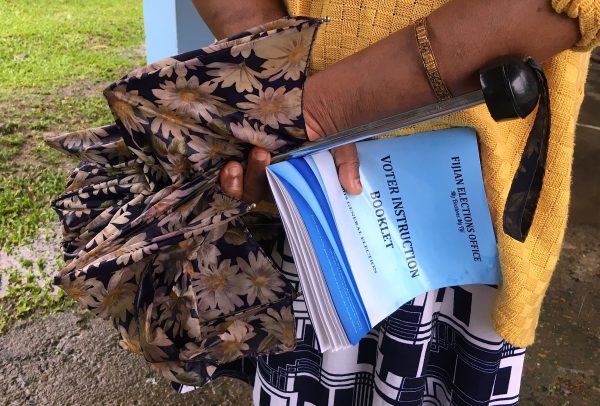There was a year-long expectation that consequential electoral change was likely, reflected in the months of uncertainty over when the election would be called. Late changes to the electoral law to advantage the incumbent FijiFirst demonstrated the concern the government felt over Fiji’s shifting political mood.
The successful registration of Sitiveni Rabuka’s People’s Alliance as a party in August 2022 was the key event in laying the foundations for the new alignment of political power emerging from Rabuka’s Christmas Eve appointment as prime minister. Offsetting this win for oppositional forces were legal challenges to possible political opponents, the most notorious being the prosecution and conviction of opposition lawyer Richard Naidu for a flippant social media post.
Looking forward, the next most significant date for Fiji will be 1 January 2024. If Prime Minister Rabuka’s coalition government remains in office until then, it will exceed the longest term of any Fijian government that came into office through a peaceful transfer of power.
Mahendra Chaudhry’s Labour-led coalition won the 1999 election after defeating Rabuka, who had served two terms as prime minister from 1992. The Chaudhry government lasted 373 days before it was forcefully removed by George Speight in a hybrid civilian–military coup. The only previous occasion where a peaceful transfer of power had occurred was in 1987, after which Timoci Bavadra’s coalition was removed from office by a military coup — led by Rabuka, then an army colonel — after just 32 days.
The key challenge in 2023 for the Rabuka government will be holding together as an effective coalition. Reconciling the differing and sometimes conflicting electoral mandates of each of the three contributing parties is likely to require deft management. The weakest link in the coalition is likely to be the Social Democratic Liberal Party (SODELPA). The party’s management board narrowly voted to join the other two coalition partners to give the three party arrangement a 29–26 majority in parliament, exposing significant divisions.
The linkages between Rabuka’s People’s Alliance and the National Federation Party appear stronger. The two parties contested the 2022 election as a working partnership and have already greatly reconciled their mandates. In addition to inter-party grievances, the three coalition partners will have to address the Bainimarama legacy and manage a large cohort of inexperienced MPs.
There are at least three domestic issues that could threaten the coalition’s stability in the year ahead — revisiting the post-2006 coup bureaucracy, managing communalism and prioritising electoral mandates.
Placing senior military personnel as the heads of government departments after the 2006 coup and claims of partisan cronyism has given Rabuka grounds for being sceptical of the previous government’s key appointments. Consequently, senior officials such as the Commissioner of Police, the Chief Justice and the Supervisor of Elections have been suspended or resigned.
The new Attorney-General and Minister for Justice, Siromi Turaga, has made it clear that an audit of the public service is a high priority for the new government. Former prime minister Bainimarama immediately pushed back, advising his appointees to resist any demands from the new government that they resign.
The Indo-Fijian community makes up barely half of the percentage of the population of Fiji that it did at independence. But communal divisions still impact the republic’s politics. The Rabuka coalition has sent mixed signals on how its administration will deal with communalism. It has dropped the name ‘Fijian Government’ in favour of ‘Fiji Government’, to the consternation of those who fear it is a gesture to iTaukei (indigenous Fijian) sentiment.
Rabuka has also announced two new national holidays in 2023 which draw attention to communal distinctions. Girmit Day honours settlers from India who signed indenture agreements to work in Fiji. Ratu Sukuna Day celebrates the life of Fiji’s greatest pre-independence iTaukei statesman. The Bainimarama government had previously discontinued it to promote inclusion.
Tightened economic circumstances will make balancing SODELPA’s focus on the socio-economic advancement of iTaukei people and the National Federation Party’s historic commitment to its Indo-Fijian base fraught with budgetary landmines.
FijiFirst MP Mosese Bulitavu, a former SODELPA member, has predicted that FijiFirst could be back in power in six months after a secret vote for speaker only carried 28–27 for the government’s candidate. There are constitutional manoeuvres that could make an early change of government less likely, but breaking coalition unity will remain a key opposition objective throughout 2023.
The non-intervention of the military was critical to the peaceful transfer of power at the end of 2022, especially Major General Jone Kalouniwai’s refusal to support Police Commissioner Sitiveni Qihilo’s call for troops in the streets after the election.
Looking back at the December election, some might be inclined to see the result as marking the end of the Bainimarama post-2006 coup era. But Bainimarama’s stand against the influence of communalism will be difficult to reverse after the 2013 constitution abolished many race-based rights that were guaranteed to indigenous Fijians under previous charters. Rabuka has given communalism fresh life — symbolically, and through the reintroduction of the Great Council of Chiefs. Ironically, Bainimarama’s promise to end Fiji’s coup culture may become part of his legacy due to Kalouniwai’s tight reins on the military after the election.
Richard Herr is Academic Director of the Parliamentary Law, Practice and Procedure course at the Faculty of Law of the University of Tasmania.
This article is part of an EAF special feature series on 2022 in review and the year ahead.

